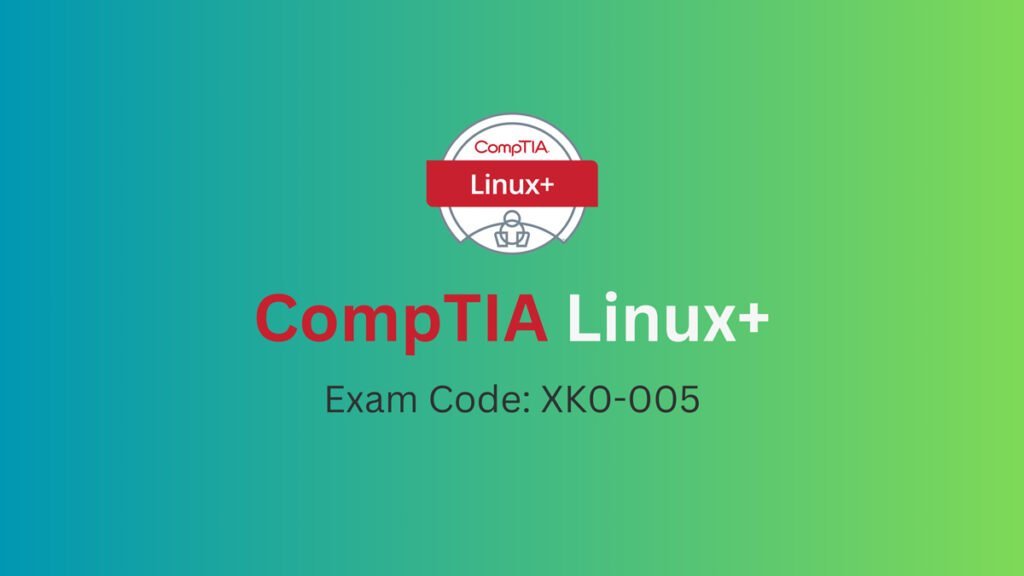In my opinion, the CompTIA Linux+ certification is worth pursuing. Learning Linux is important, as it is used in everything from mobile phones to supercomputers, the cloud, and network devices. Many companies rely on Linux for their day-to-day operations. Earning the Linux+ certification can not only help you land your first job but also open numerous opportunities in cloud computing, security, and networking, giving you a competitive edge over other candidates.
To help you determine if Linux+ is the right choice for you, we will consider factors like job demand, alternative certification options, potential salary, and the time and effort required to earn the certification. Let’s dive in.
Table of Contents
CompTIA Linux+ Certification Overview:

CompTIA Linux+ validates the competencies required of an early career systems administrator supporting Linux systems. This certification is designed to validate the skills and knowledge of IT professionals in configuring, managing, operating, and troubleshooting Linux servers in both on-premises and cloud environments. It emphasizes security best practices, scripting, containerization, and automation. This certification is suitable for individuals with at least 12 months of hands-on experience working with Linux servers, typically in roles like junior Linux support engineer or junior cloud/DevOps support engineer.
Who Should Consider CompTIA Linux+?
If you’re passionate about Linux, CompTIA Linux+ can be a starting point, especially if you’re early in your IT career. It’s a widely recognized certification that validates your skills and can help you stand out to potential employers. While it might not be essential for everyone, particularly those with extensive Linux experience, it can be a worthwhile investment for those looking to solidify their knowledge, enhance their resume, and potentially open doors to new opportunities in the field.
What You Will Be Tested on the Certification Exam
The CompTIA Linux+ certification exam rigorously assesses your Linux skills and knowledge. Covering a wide range of topics, the exam ensures that certified professionals are well-prepared to manage the complexities of Linux administration in both on-premises and cloud environments. Here is a brief overview of the exam:
| Exam Code | XK0-005 |
|---|---|
| Launch Date | July 12, 2022 |
| Exam Description | Focuses on how Linux powers the cloud, includes cutting-edge technologies for automation and orchestration. |
| Number of Questions | 90 |
| Question Types | Performance-based, Multiple Choice (Single Response), Multiple Response, Fill-in-the-Blank |
| Length of Test | 90 Minutes |
| Passing Score | 720 (on a scale of 100 to 900) |
| Recommended Experience | 12 months hands-on with Linux servers; CompTIA A+, Network+, Server+ or similar recommended |
| Retirement Date | January 1st, 2023 (English); August 2nd, 2023 (Japanese) |
Core Domains of the Exam
The exam is structured around four primary domains, each focusing on a critical aspect of Linux expertise:
- System Management (32%): This domain delves into the fundamentals of Linux, including the file system hierarchy, boot process, package management, storage configuration, and service management. Candidates are expected to demonstrate proficiency in managing files and directories, configuring storage solutions, working with processes and services, and utilizing networking tools and configuration files.
- Security (21%): Security is a paramount concern in any Linux environment. This domain assesses candidates’ understanding of security best practices, identity management, firewall configuration, remote system management, and access controls. Topics such as public key infrastructure (PKI), authentication mechanisms, Linux hardening techniques, and file permissions are covered in detail.
- Scripting, Containers, and Automation (19%): Automation and scripting are essential for efficient Linux administration. This domain evaluates candidates’ ability to create shell scripts, work with containers, and understand infrastructure as code (IaC) concepts. Familiarity with Git for version control, as well as knowledge of container orchestration tools like Kubernetes, is also tested.
- Troubleshooting (28%): Troubleshooting is a core skill for any Linux professional. This domain focuses on diagnosing and resolving issues related to storage, networking, CPU and memory utilization, user access, and file permissions. Candidates are expected to analyze system logs, identify bottlenecks, and apply appropriate solutions to restore system functionality.
How Much Does CompTIA Linux+ Exam Cost?
The Linux+ certification exam cost varies depending on your location. In the US, it’s $369 USD, while in emerging markets, it’s reduced to $207 USD. In Europe, prices range from £218 GBP in the UK to €333 EUR in the Eurozone. In Japan, it costs ¥43,338 JPY, while in Australia, it’s $499 AUD. South Africa has a fee of 2,839 ZAR.
| Country | Currency | Price |
|---|---|---|
| USA | USD | 369 |
| Emerging Market | USDe | 207 |
| Great Britain | GBP | 218 |
| EURO | EURO | 333 |
| Japan | JPY | 43,338 |
| Australia | AUD | 499 |
| South Africa | ZAR | 2,839 |
Does CompTIA Tech+ Require Prior Experience?
There are no strict prerequisites for the CompTIA Linux+ certification. But CompTIA recommends having 12 months of hands-on experience working with Linux servers. Additionally, having CompTIA A+, Network+, and Server+ certifications or equivalent knowledge benefits a smoother learning experience. However, you can still pursue the certification without prior experience or certifications, though additional study and practice may be required.
Is CompTIA Linux+ hard?
The difficulty of the CompTIA Linux+ exam varies widely depending on your existing Linux knowledge and skills.
If you have a strong foundation in Linux administration, the exam may still pose a challenge but is achievable with focused preparation. The breadth of topics covered, such as in-depth command line usage, scripting, and system administration tasks, can be demanding even for seasoned users.
For those newer to Linux, the exam will likely be considerably more difficult. The steep learning curve, combined with the wide array of topics, can make it seem daunting. It’s common to find specific areas that are particularly challenging, even for experienced Linux users.
How Long to Study for CompTIA Linux+?
Preparation time for the CompTIA Linux+ exam is highly individual, depending largely on your existing Linux knowledge and experience. If you regularly use Linux or work in a Linux-centric environment, you might be able to comfortably prepare in 4-6 weeks with consistent, focused study.
For those newer to Linux or with limited hands-on experience, a more realistic timeline is likely 2-3 months, assuming a dedicated study schedule of a few hours per day. This allows for a deeper understanding of core concepts and ample time for practice.
Ultimately, success on the Linux+ exam hinges on understanding and applying concepts, not just rote memorization. Hands-on practice in a lab environment is crucial for solidifying your knowledge and building the confidence needed to pass the exam.
What Jobs Can I Get with CompTIA Linux+?
With a CompTIA Linux+ certification, you can pursue roles such as Linux Administrator, Linux Engineer, Database Administrator, Systems Administrator, and Network Administrator. These positions involve responsibilities like installing, configuring, and maintaining Linux systems, performing system maintenance, troubleshooting issues, ensuring hardware and software functionality, managing databases, and maintaining network performance. The median salaries for these roles range from $81,000 to $99,000, reflecting the high demand for professionals with Linux skills. A CompTIA Linux+ certification opens doors to various IT positions, including:
- Entry-Level
- Systems Administrator
- Junior Linux Engineer
- Help Desk/Technical Support (Linux focus)
- Mid-Level
- Linux Systems Administrator
- Linux Engineer
- DevOps Engineer (Linux expertise)
- Senior-Level
- Senior Linux Engineer/Architect
- Cloud Solutions Architect (Linux)
How In-Demand is CompTIA Linux+ Certification?
CompTIA Linux+ certification is in moderate demand(compared to A+, Network+, and Security+). While it may not be the most prestigious or advanced certification compared to others like Red Hat Certified System Administrator (RHCSA), Linux+ offers a vendor-neutral foundation that can be valuable for entry-level positions. Industry perception varies, with some employers prioritizing hands-on experience over certification.
However, for those new to Linux or with foundational certifications, Linux+ can enhance resumes and demonstrate Linux skills, though its value ultimately depends on career goals and the target job market.
Is CompTIA Linux+ Worth It?
Whether the CompTIA Linux+ is “worth it” depends on your specific goals and circumstances. Based on the Reddit thread, here’s my take:
Linux+ can be a good starting point: If you’re new to Linux and want a structured way to learn the fundamentals, Linux+ can provide a solid foundation. It covers a broad range of topics, from basic commands to system administration tasks, giving you a good overview of the Linux landscape.
Hands-on experience is crucial: Linux+ demonstrates theoretical knowledge, and employers value practical experience more. Building a home lab, contributing to open-source projects, or working on personal projects are excellent ways to gain hands-on skills and make your resume stand out.
Consider Red Hat certifications: If you’re serious about a career in Linux administration, Red Hat certifications (RHCSA, RHCE) are generally considered the gold standard. They’re more challenging and hands-on, but they hold more excellent value in the job market, especially for roles involving Red Hat Enterprise Linux.
Ultimately, the decision is yours: If you’re passionate about Linux and want to build a strong foundation, Linux+ can be a worthwhile investment. But remember, it’s just one step in your journey. Focus on gaining practical experience and developing your skills continuously to succeed in the ever-evolving world of IT. Before you decide, always remember: having a cert is always better than having no cert.



